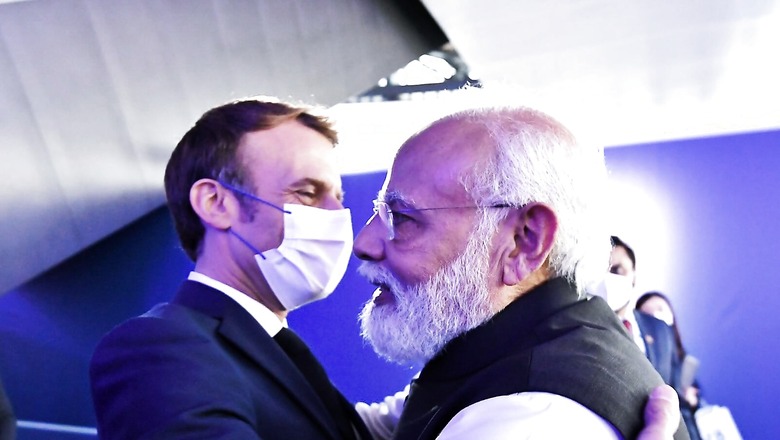
views
It is said that the French are guided by the ‘heart’ while voting in the first round of the Presidential elections and the ‘head’ during the second. The news that the ‘head’ prevailed yet again and the electorate bestowed a 17 per cent lead (down from 32 per cent in 2017) to the incumbent Emmanuel Macron over Marine Le Pen, in the conclusive round on April 24, 2022, was received with undisguised joy across the world including India.
“Congratulations to my friend @EmmanuelMacron on being re-elected as the President of France! I look forward to continue working together to deepen the India-France Strategic Partnership,” tweeted PM Narendra Modi soon after the formal announcement. The Indian Prime Minister had good reason to be pleased given the excellent personal rapport that the two leaders enjoy and the momentum they have imparted to the relationship.
Modi had set aside protocol in paying a personal visit to Paris within days of Macron ascending the Elysee Palace in May 2017. Making an exception yet again, he received the youthful French leader at the airport tarmac when the latter visited India in 2018. He’s all set to do an encore on May 4, 2022, this time to give a bear hug to a friend and partner in Paris, who defied the two-decade-long single-term jinx to get re-elected despite the best-ever showing by Marine Le Pen, his far-right challenger.
India sees France as a “major power with a global outlook and an independent mindset”. A country that believes in “multipolarity”, shuns “dogmatism” and has been “extremely responsive to India’s concerns and priorities”. Our ties have been “free from sudden shifts and surprises that we sometimes see in other cases” (hope certain Capitals have taken note!) — noted Minister of External Affairs Dr S. Jaishankar in his seminal address at the French Institute of International Relations (IFRI) earlier this year in February during his visit to Paris. Not many of India’s partners will match up to such a billing.
ALSO READ | AUKUS or Not, Why France is India’s Preferred Partner for Nuclear Attack Submarines
A Bridge to European Union
Though India and France have enjoyed a long-standing relationship, the turning point came in 1998 when France refused to join the high-decibel western chorus criticising India’s nuclear tests in May. A similar determination to safeguard autonomy in foreign policy decisions was evident when France declined to participate or send its troops to Iraq during the second Gulf War in 2003, despite being a US ally and a NATO member, as the military action was not authorised by the UN Security Council. The US and the UK were livid and so was the English language media but Paris held its ground. Germany and India had already refrained from committing their soldiers.
The public disapproval of France was perceptibly high during the period. A popular anecdote had it that an American visiting London consumed too much beer and had to urgently ease himself. He consulted a ‘bobby’ who escorted him a few hundred yards and asked him to enter the building through a wicket gate into a manicured garden. Business done; the visitor chirped “so this is British hospitality?”. “No sir,” replied the cop, “this is the French Embassy”.
During that trying period, bilateral ties were elevated to a strategic partnership when prime minister Vajpayee visited Paris in September 1998. It marked a first for India. A strategic dialogue was initiated between the sides, to review India’s security imperatives, strategic compulsions and the nuclear issue. It was led by principal secretary to PM Brajesh Mishra and Gerard Errera, special envoy to President Jacques Chirac. Then posted in Tokyo, I recall a western diplomat complaining that the French and Russians had started speaking in the Indian voice.
Be that as it may, bilateral cooperation has steadily gained in scope, depth and sophistication, including in defence, space, digital technology and civil nuclear energy domains. It is not for nothing that a French dignitary has been the chief guest at India’s Republic Day celebrations five times, which is the highest number of invites that India has extended to any country.
France has become a critical partner for our national security. Our defence partnership is decades-old starting with a major acquisition of French fighter aircraft in the early 1950s. The External Affairs Minister acknowledged that India’s concept of “credible minimum nuclear deterrence” was derived from the French.
We have since scaled up the engagement to include mil-to-mil exchanges, joint military exercises, procurement of fighter jets and submarines as well as co-development and co-production of defence hardware. France has consistently displayed the necessary flexibility and understanding of India’s requirements. The 20th round of India-France Joint Staff talks was held earlier this month in New Delhi to accelerate defence cooperation.
France is perhaps the only country in Europe that is a genuine resident power in the Indo-Pacific region having jurisdiction over a vast EEZ (exclusive economic zone), spanning 9.1 million sq km and territories like the Reunion Island, Mayotte, French Southern and Antarctic Lands, New Caledonia and French Polynesia, where 1.6 million of its citizens reside. We enjoy a marked convergence in our approach to maintaining a rule-based regional order that is inclusive, free of coercion and democratic.
Unlike most European countries, France is taking a firmer stand on China, while staying invested in the ties. Public opinion of China is turning increasingly negative in France. On the other hand, during his visit to India in 2018, President Macron stated — “India has been France’s first ally in the region. It is the entry point for France in the region, and my aim is to make France the entry point for India to Europe”. External Affairs Minister spoke in the same refrain at IFRI in February — “France has been an important bridge for us to the European Union”. It may be added that France is a natural candidate to join the QUAD as and when the forum is expanded.
Ties on Terra Firma
Back to the re-election of President Macron, as noted above bilateral relations have taken significant strides under his and PM Modi’s watch. The two leaders teamed up to co-host the Founding Summit of the International Solar Alliance (ISA) in New Delhi in 2018. ISA is one of the flagship initiatives of the Modi government. They unveiled a Joint Strategic Vision of India-France Cooperation in the Indian Ocean Region; agreed to hold biennial summits; annual defence dialogue at the ministerial level, and welcomed the conclusion of a reciprocal logistics support agreement between their armed forces.
At the personal invitation of Macron, reflective of their chemistry, Modi visited France to take part in the G-7 Summit, even though India is not a member of the grouping. An Implementing Arrangement between ISRO and CNES France for Joint Maritime Domain Awareness was signed during this visit. They unveiled a bilateral “Roadmap on Cybersecurity and Digital Technologies” to enhance digital partnership and step up cooperation in digital governance, cyber security and the fight against cybercrime. In February, the sides adopted a roadmap announcing a plan to establish an India-France partnership on the blue economy and ocean governance.
In his second term the French president would have a lot on his plate such as healing the societal divide, coping with inflation and dealing with the Ukrainian crisis. However, he and PM Modi can rightfully draw comfort that they have placed India-France ties on terra firma. “There are infinite possibilities in the India-France Strategic Partnership as we continue to push the boundaries to be a force for global good” — the Indian Foreign Secretary could not have said it better!
The author is Former Envoy to South Korea and Canada and Official Spokesperson to the Ministry of External Affairs. The views expressed in this article are those of the author and do not represent the stand of this publication.
Read all the Latest Opinions here
















Comments
0 comment